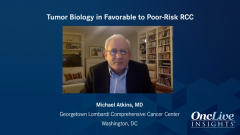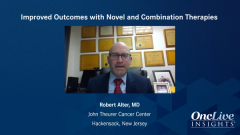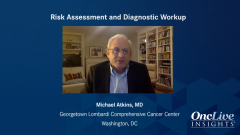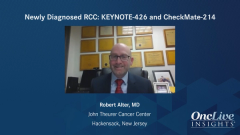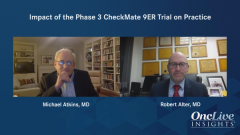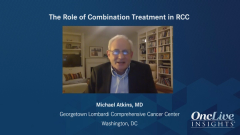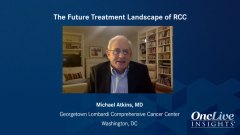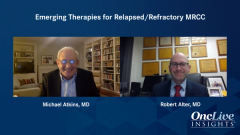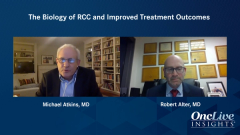
The Role of Combination Treatment in RCC
Episodes in this series

Robert Alter, MD: The sequencing issue is something we were talking about even when we first said sorafenib and sunitinib, which goes back to which agent to use first. It takes us back 14 years or so. When you deal with community oncologists, and I speak to them often, you still deal with physicians who are using ipilimumab-nivolumab for other conditions rather than just using it for renal cell carcinoma. Kidney cancer is not the most common disease that they’re dealing with; they’re commonly seeing lung cancers and melanomas as well, and they’re not using it with other cancers in combination. They may have a comfort level using combination immunotherapy, albeit with a bit of a different dosage of ipilimumab. But they’ve fallen into it, and it may be cleaner to give I/O [immuno-oncology]–I/O therapy, and then upon progression, you have a TKI [tyrosine kinase inhibitor]. This is compared with the questions we also ask: If you’re getting I/O–TKI as a first-line therapy and you progress, when do you throw the next I/O agent in? Do you throw it in as a single agent and use a TKI in the next sequence?
When you’re dealing with community oncologists, their vast knowledge about how to take care of a multitude of malignancies is significantly impressive. It sometimes gets cleaner when you lead with an I/O–I/O therapy and lead to a TKI. They may have given a little favor to axitinib-pembrolizumab, but when I speak to the community oncologist, I still think they’re using an I/O–I/O as first-line therapy.
Michael Atkins, MD: That’s interesting. There was a general assumption that the community may have been moving more toward TKI–I/O because of what I would consider a misconception that that therapy is better tolerated than giving ipilimumab-nivolumab because of their concern about the toxicity of ipilimumab. I always point out that ipilimumab-nivolumab is essentially for 12 weeks, and then it’s just nivolumab. Not everybody experiences the toxicity of ipilimumab-nivolumab: It’s closer to a third of patients. For most of those patients, it’s rarely treatable with immunosuppressive drugs for a short period of time. If patients end up in the hospital for colitis or elevated liver function tests, it’s usually for only a couple of days, and then they’re out on steroids and recovering. A few patients may need some extra immunosuppressive treatment like infliximab, but a majority of patients recover from those toxicities within 4 to 6 weeks. They are off immunosuppressive drugs, and many of them can go on and continue to receive nivolumab without having those toxicities recur.
This contrasts with axitinib-pembrolizumab, which probably doesn’t have the same risk of putting people in the hospital because of toxicity. However, the patient doesn’t have the opportunity to get a single-agent anti–PD-1 agent either in the future. If you’re exposed to an anti-VEGF, it may be tolerable in the beginning, but months and months of receiving a VEGF-targeted therapy is not good for your tissues. It is associated with a lot of diarrhea, a risk of cardiovascular problems, and weight loss. Patients don’t do well if they’re going to be on a TKI for a long period of time. My experience is that once you start a TKI, it’s very hard to stop it. Even if patients are not responding, you’re often going to a new TKI.
Robert Alter, MD: That’s right.That reminds me of the amphotericin days back in the 1980s and 1990s.
Michael Atkins, MD: Yes. That’s way back, but if you see a patient who is really sick, and their performance status is less than 70%, I still feel like that’s a patient for whom I want to start with immunotherapy because I’ve seen dramatic responses in some of those patients. It’s almost like the Lazarus effect. Those are patients for whom you can see major benefit with immunotherapy. For many of them, you don’t see any benefit, but you really don’t see benefit with TKIs in those patients.
Robert Alter, MD: That’s right. We’re coming into the time of year that is like the doughnut hole: Patients are also having to consider the cost of these oral therapies. Last week, the cost of these therapies was presented at the International Kidney Cancer Symposium. When you look at a year of I/O–I/O, it came out to about $333,000 to continue a year of initial 4 doses of ipilimumab-nivolumab followed by nivolumab, compared with almost $100,000 more having an I/O–TKI. We’re dealing with a patient population for whom, at this period of time through September and December, their out-of-pocket costs can sometimes be very financially toxic, despite the fact that they may have good tolerability. I agree with you. These patients taking pills every day offer toxicities that can be chronic. Twice today, I’ve dealt with patients who have this financial toxicity, and you hope that, through whatever foundation, you can get them money through the end of the year. They’re starting to balance it. There are sometimes medications that you can adjust the dose, but for the most part, these patients are living on the oral therapies, and it’s concerning.
Transcript Edited for Clarity


